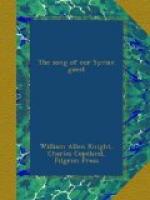“Then there are snake holes in some kinds of ground, and, if they be not driven away, the snakes bite the noses of the sheep. The shepherd sometimes burns the fat of hogs along the ground to do this. Sometimes the shepherd finds ground where moles have worked their holes just under the surface. Snakes lie in these holes with their heads sticking up ready to bite the grazing sheep. The shepherds know how to drive them away as they go along ahead of the sheep.
“And around the feeding-ground which the shepherd thus prepares, in holes and caves in the hillsides there are jackals, wolves, hyenas, and panthers, too, and the bravery and skill of the shepherd are at the highest point in closing up these dens with stones or slaying the wild beasts with his long-bladed knife. Of nothing do you hear shepherds boasting more proudly than of their achievements in this part of their care of flocks.
“And now,” he exclaimed with a beaming countenance and suppressed feeling, as if pleading for recognition of the lone shepherd’s bravest act of devotion to his sheep, “and now do you not see the shepherd figure in that quaint line, ’Thou preparest a table before me in the presence of mine enemies’?”
“Yes,” I answered; “and I see that God’s care of a man out in the world is a grander thought than that of seating him at an indoor banquet-table.”
“But what about anointing the head with oil and the cup running over? Go on, my friend.”
“Oh, there begins the beautiful picture at the end of the day. The psalm has sung of the whole round of the day’s wandering, all the needs of the sheep, all the care of the shepherd. Now the psalm closes with the last scene of the day. At the door, of the sheepfold the shepherd stands and ‘the rodding of the sheep’ takes place. The shepherd stands, turning his body to let the sheep pass; he is the door, as Christ said of himself. With his rod he holds back the sheep while he inspects them one by, one as they pass into the fold. He has the horn filled with olive-oil and he has cedar-tar, and he anoints a knee bruised on the rocks or a side scratched by thorns. And here comes one that is not bruised but is simply worn and exhausted; he bathes its face and head with the refreshing olive-oil and he takes the large two-handled cup and dips it brimming full from the vessel of water provided for that purpose, and he lets the weary sheep drink.
“There is nothing finer in the psalm than this. God’s care is not for the wounded only, but for the worn and weary also. ’Thou anointest my head with oil; my cup runneth over.’
“And then, when the day is done and the sheep are snug within the fold, what contentment, what rest under the starry sky! Then comes the thought of deepest repose and comfort: ’Surely goodness and mercy shall follow me all the days of my life,’ as they have through all the wanderings of the day now ended.




